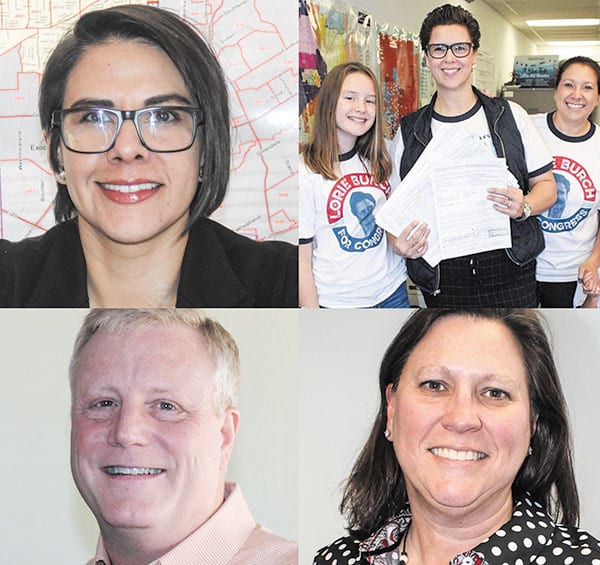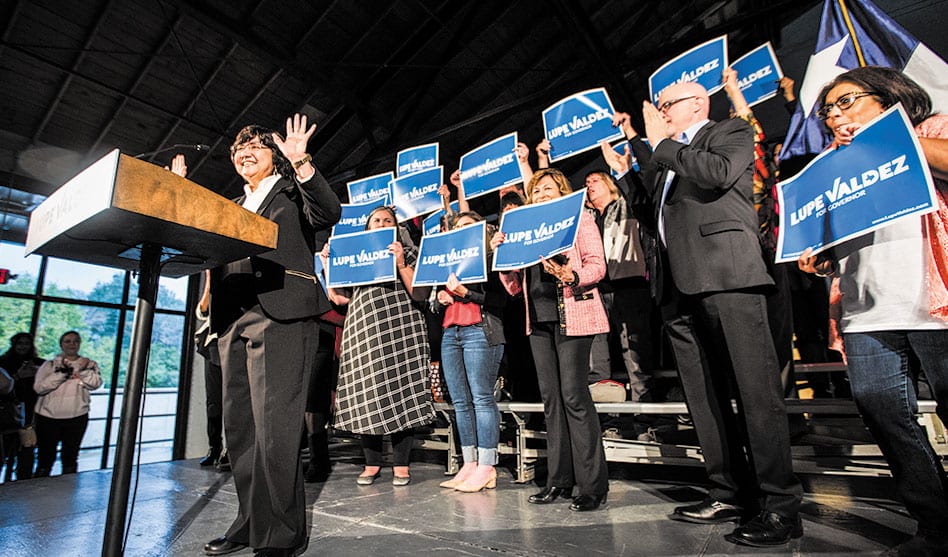Lupe Valdez won nearly 43 percent of the vote in a nine-way race. (Ashley Landis/DMN via AP)
Johnson could become second Dallas lesbian in Legislature, while Phariss faces tough race against Paxton
DAVID TAFFET | Senior Staff Writer
taffet@dallasvoice.com
Former Dallas County Sheriff Lupe Valdez is in a runoff set against former Gov. Mark White’s son, Andrew, to decide who will be the Democratic nominee for governor. Winner of the May 22 election will face Gov. Greg Abbott in December.
Although she didn’t hit the 50 percent mark necessary to avoid a runoff, Valdez finished the March 6 primary with a commanding lead over the other eight candidates, taking 42.9 percent of the vote. White came in second, with 27.4 percent.
Dallas businessman Jeffrey Payne, the other gubernatorial candidate from the LGBT community, finished in fifth place, out of nine candidates, with 4.8 percent.
Valdez is given much of the credit for turning Dallas County blue. When she was elected in 2004, she was one of just a few Democrats who bothered to challenge Republicans locally. And once in office, she faced a hostile sheriff’s department and jails that were under federal order to reform.
Valdez turned around the attitude toward her among those now working for her and improved conditions in the county jail. She was returned to office three more times, each time by more and more comfortable electoral margins.
Valdez resigned her position as sheriff in December to run for governor and has been considered the frontrunner since she threw her hat in the ring.
Her press office pointed out after Tuesday’s vote that Valdez won majorities in most urban areas, including Dallas, Hidalgo, Nueces, Travis and Webb counties, and that she won double-digit pluralities in Bexar, El Paso, and Tarrant counties. White prevailed in his home county — Harris.
“We look forward to building on the numbers and excitement of the voters who came out to make a change,” Valdez said in a press release after the vote. “[Tuesday], Texas Democrats got the first chance to push back against hate, and we showed up. This is only the beginning.
“I’ve been blessed to live a life of service and hard work,” she added. “I’ve enjoyed the opportunity the great state of Texas provides. That’s why I’m in this race, so that working Texans have the fair shot we all deserve.”
Payne was the first candidate to enter the race. Since last July, he’s been traveling the state, and in his concession speech said he was proud of being the only candidate running for governor to visit some of the counties where he spent time.
Payne also told his supporters that he was proud that his campaign had “changed the conversation” among the candidates, and that his candidacy had forced White “to the left” on some issues.
U.S. House District 3
For most of the evening on Tuesday, Lorie Burch was in the lead in her race for the Democratic nomination for U.S. House District, with just a little more than 50 percent of the vote — a margin that would have sent her straight through to the general election without a runoff.

Clockwise from upper left: Jessica Gonzalez, Lorie Burch flanked by her wife and daughter, Julie Johnson and Mark Phariss
But the final vote count left her less than 1 percentage point shy of the 50 percent threshold, and in May she will face Sam Johnson, who brought in 28.7 percent in the four-way race. The runoff winner will face Republican Van Tyler, who cruised to the Republican nomination with 87.4 percent in a three-way race.
“This morning, I wake up more determined than ever to win this election,” Burch tweeted the day after the election. “Not just the runoff on May 22. But the general election in November.”
Burch is an attorney and, like many of the LGBT candidates running for office this year, running her first campaign.
Burch said before the primary there was talk about whether or not she was electable. But in a four-way race, she ended the primary balloting more than 21 points ahead of her closest rival.
“The message from voters is that our message resonates,” Burch said.
Collin County is growing rapidly, she explained, with companies moving to the area from more progressive locations around the country. Compared to even a few years ago, the district’s population is younger, more diverse and more open to electing a candidate from the LGBT community.
For now, Burch said, she’s focused on the runoff that will help her build a stronger race for the general election in November.
Texas Senate
Mark Phariss maintained a slim lead in the two-way race for the Democratic nomination for the District 8 Senate seat, winning his primary with 50.9 percent of the vote. The district includes southwest Collin County and 32 precincts in northern Dallas County.
Phariss and his husband, Vic Holmes, were one of two couples who challenged Texas’ anti-equality marriage laws and won. They won their case on the U.S. District Court level, but a three-judge panel at the 5th Circuit Court of Appeals never issued a ruling after hearing the case. Instead, after the U.S. Supreme Court’s Obergefell marriage equality decision in 2015, the 5th Circuit affirmed the ruling of the lower court, assuring marriage equality in Texas.
Phariss now faces Angela Paxton, wife of indicted Texas Attorney General Ken Paxton, in November. She won a vicious and expensive campaign against Phillip Huffines for the Republican nomination. Her husband held the Senate seat before running for attorney general, and his replacement, Van Taylor, is the Republican nominee for the U.S. House seat currently held by retiring Rep. Sam Johnson.
Phariss said the number of people voting in the primary was encouraging. About 7,000 people usually vote in his senatorial district’s primary. This election 32,000 votes were cast — about a 450 percent increase in Democratic voting.
“I’m thrilled by my win,” Phariss said. “I’m thankful for my supporters and volunteers, and I’m looking forward to the general election and a positive campaign where we will focus on the issues.”
Texas House
In two key Dallas County state House races, Jessica Gonzalez scored an upset victory over 10-term incumbent Roberto Alonzo, and Julie Johnson won her primary with a decisive 77 percent of the vote.
Gonzalez received 62.5 percent of the vote in her race to represent District 104, which snakes through parts of West Dallas, Oak Cliff and Cockrell Hill then on into Grand Prairie and south Irving.
Alonzo served in the Legislature from 1993 until 1997, when he lost to Domingo Garcia. He regained his seat in 2003, and Gonzalez was the first to challenge him since then.
There is no Republican in the District 104 race, meaning that Gonzalez has a clear path ahead to a seat in the 86th Texas Legislature in 2019. Her victory ensures the largest LGBT delegation to ever serve in the Texas House.
Incumbents Celia Israel, D-Austin, who ran unopposed, and Mary Gonzalez, D-El Paso, who won her primary by a large margin, both are guaranteed to return to the Legislature in January. But the LGBT caucus could double compared to 2017, depending on the outcome of another Dallas County race.
In northwest Dallas County, attorney Julie Johnson won her primary with 76 percent of the vote. She now faces incumbent Matt Rinaldi in November.
Rinaldi is best known as the author of the House version of the bathroom bill. Johnson is focusing on education in the classroom not the bathroom, a theme she said resonated with voters as she campaigned throughout the district.
If Rinaldi is defeated by a lesbian, that could generate as much national publicity as when Danica Rohm, who is transgender, defeated a Virginia delegate who proudly labeled himself the state’s “chief homophobe.”
……………….
For Coverage of other LGBT and ally candidates, visit DallasVoice.com

